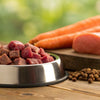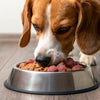Can Raw Food Make Your Dog Constipated? Understanding Digestion in Raw-Fed Dogs
- Houndsy
Table of Contents
- Introduction
- Understanding Canine Digestive Health
- Can Raw Food Cause Constipation?
- Identifying Signs of Constipation
- Solutions and Preventive Measures
- Remedies for Constipation
- Conclusion
Introduction
Did you know that around 12% of dogs experience constipation at some point during their lives? This figure isn’t a shocking reveal—it's a shared experience among many dog owners who transition their furry companions to a raw food diet. The excitement of seeing our pets thrive on a more natural, species-appropriate diet can sometimes be paired with confusion when they also experience occasional constipation. As pet lovers, it's crucial for us to understand how feeding raw food could potentially influence our dog's digestive health.
In this blog post, we aim to shed light on a commonly asked question: Can raw food make your dog constipated? We will dissect the various contributing factors that can lead to constipation, explore ways to prevent it, and discuss remedies for when it occurs. By the end, you’ll have the tools and insights needed to ensure your dog's digestive well-being, enabling you to make informed choices that support a healthy feeding routine.
As we navigate through this topic, we invite you to reflect on your own dog’s feeding habits and experiences. Are they experiencing regular, healthy bowel movements? Do you notice any changes in their stool consistency after changing their diet? Let’s embark on this journey together to uncover the factors at play with raw diets and canine digestion.
Understanding Canine Digestive Health
To truly grasp how raw food might lead to constipation in dogs, we need to first understand how their digestion functions and how diet plays a role. Dogs have evolved over thousands of years with a digestive system designed to handle raw meats, bones, and organs—essentially mimicking what their ancestors ate in the wild.
1. The Basics of Canine Digestion
Dogs belong to the carnivore family, which means their digestive systems are tailored to process raw protein efficiently. Their stomachs produce strong acids and enzymes that break down meat and fat, and their intestines are equipped to absorb necessary nutrients effectively. Here are some key components related to canine digestion:
- Gastric Acidity: Dogs possess a highly acidic stomach (pH 1-2) that aids in digesting bacteria and pathogens found in raw food.
- Digestive Enzymes: Proteins, fats, and carbohydrates are broken down by enzymes produced in the stomach and pancreas, aiding nutrient absorption.
- Gut Flora: A balance of healthy bacteria in the gut supports digestion, nutrient absorption, and overall gut health.
However, any dietary change, including a shift to raw food, can influence this delicate system.
2. The Impact of Diet on Digestion
When transitioning to a raw food diet, it is essential to consider specific factors that may affect digestion and stool consistency:
- Bone Content: Raw diets typically contain bones that provide essential calcium. However, an excess of bone content may lead to hard, chalky stools, which can contribute to constipation.
- Moisture Levels: Unlike kibble, which is often dehydrated, raw food contains significant moisture. This hydration level influences digestion and stool quality.
- Fiber Intake: While raw diets may provide sufficient protein, they may lack adequate fiber if not balanced correctly. Insufficient fiber can impede regular bowel movements.
Understanding these aspects lays the groundwork for addressing constipation in dogs on a raw food diet.
Can Raw Food Cause Constipation?
The answer to whether raw food can make your dog constipated is multi-faceted. While a well-balanced raw diet generally supports healthy digestion, specific missteps in feeding can lead to constipation. Here are some factors that can exacerbate the issue:
1. High Bone Content
One of the most common reasons for constipation in dogs on a raw food diet is the overconsumption of bones. Since bones are essential for calcium and phosphorous, they are often included in raw food formulations in varying proportions.
- Too Much Bone: Excess bone consumption can lead to hard, dry stools, as the dietary calcium can cause talcum-like consistency. Symptoms of this issue might include straining to defecate or infrequent bowel movements.
2. Low Fiber Intake
Although raw diets can be protein-heavy, many may not provide sufficient fiber to promote healthy digestion.
- Lack of Fiber Sources: Dogs require fiber to help bulk up and soften the stool. When transitioning from kibble—which often contains various fiber sources—to a raw diet lacking these fiber-rich ingredients, dogs may lack the necessary support for regular bowel movements.
3. Dehydration
Dehydration can lead to harder stools and decreased intestinal movement.
- Moisture in Food: While raw food contains more moisture than kibble, it's vital to ensure your dog remains adequately hydrated with fresh water. If they are not drinking enough water, or if the raw food lacks proper hydration, they may experience constipation.
4. Transition Period
When making any significant dietary changes, dogs often need time to adjust to their new food.
- Digestive Upset: Some dogs may experience temporary digestive issues, including constipation or diarrhea, as their systems adapt to a new diet. These adjustments are typically resolved with time.
5. Stress and Environment
Much like humans, stress can have a physical impact on a dog's gut health.
- Stress-Induced Symptoms: Changes in routine, environment, or even feeding location can negatively affect digestion. If a dog feels anxious, it can disrupt normal bowel movements, leading to constipation.
Identifying Signs of Constipation
Recognizing constipation involves paying close attention to your dog’s behavior and stool consistency. Symptoms may include:
- Straining to defecate
- Producing little to no stool
- Hard or dry stools
- Lethargy or loss of appetite
Awareness of these signs allows pet owners to take appropriate action. If straining persists for more than 24 hours or if you observe other concerning symptoms (like vomiting, loss of appetite, or blood in the stool), it is essential to consult with your veterinarian promptly.
Solutions and Preventive Measures
Understanding how to prevent and address constipation equips us as responsible pet owners to support our dogs’ health effectively. Here are some actionable strategies:
1. Adjust Bone Content
The first step in addressing constipation associated with raw diets often involves assessing bone content.
- Monitor Bone Intake: Ensure your dog’s food includes approximately 10% bone, as this is generally considered optimal for healthy digestion. If feeding raw meaty bones, consider reducing the frequency or amount when transitioning diets or when constipation appears.
2. Increase Fiber
Adding fiber to your dog’s diet can help encourage regular bowel movements.
- Fruits and Vegetables: Incorporate diced vegetables like green beans or pumpkin, which are known for their laxative effect and high fiber content.
- Pumpkin Puree: Canned, unsweetened pumpkin is often recommended due to its high soluble fiber content, which can help bulk up and soften stools.
3. Hydration Is Key
Hydration plays a crucial role in digestion.
- Fresh Water: Always provide access to fresh water. If your dog is reluctant to drink enough, consider offering bone broth, which not only enhances hydration but also adds flavor.
4. Probiotics and Supplements
Introducing probiotics can promote a healthy gut flora balance, aiding in digestion.
- Digestive Enzymes: Consider adding canine-specific probiotics or digestive enzyme supplements to support your dog’s gut health.
5. Regular Exercise
Physical activity stimulates bowel movement and improves overall well-being.
- Daily Walks: Ensure your dog gets regular exercise to facilitate healthy digestion.
6. Gradual Transition
When moving your dog to a raw diet, a gradual introduction can help avoid digestive stress.
- Introduce Slowly: Transitioning over a week or so, mixing old and new foods until you reach the desired balance, can help minimize digestive upset.
7. Maintain Stress-Free Environments
Dogs can be sensitive to their surroundings, and providing a calm space for them to relieve themselves is essential.
- Safe and Quiet Areas: Ensure your dog has a quiet, familiar environment for bathroom breaks, free from distractions and anxiety.
Remedies for Constipation
If your dog does become constipated, here are some immediate actions you can take to help alleviate their discomfort:
1. Diet Adjustments
Temporarily modify your dog’s diet to exclude bone content.
- Boneless Meals: Feed boneless meat and organs for a short period to allow their digestive system to reset.
2. Natural Remedies
Incorporating natural remedies often yields positive results.
- Psyllium Husk: Another beneficial addition is psyllium husk, which helps retain water in the gut and can provide bulk to stools.
- Slippery Elm: Known for its soothing properties, slippery elm can also promote digestive health.
3. Consult a Veterinarian
If your dog is straining consistently without relief, seek professional advice.
- Veterinary Guidance: A healthcare provider can rule out more serious issues such as blockages or other underlying health conditions.
Conclusion
By understanding the relationship between raw food and canine constipation, we empower ourselves to make thoughtful feeding choices that prioritize our pets' health and well-being. Incorporating a balanced raw diet while monitoring bone content, fiber intake, hydration, and overall lifestyle helps to create an environment where our furry friends can thrive.
As we navigate the world of raw feeding, we can foster happier, healthier dogs, ultimately transforming their feeding rituals into enjoyable, tension-free experiences. If you're looking to simplify and elevate your dog's feeding experience, consider transitioning to a product that not only boasts functionality but also aesthetic appeal, such as the Houndsy Kibble Dispenser. This innovative solution ensures perfect portions while complementing your home decor.
To explore our flagship product, visit the Houndsy Kibble Dispenser product page here and elevate your feeding experience today!
FAQ
Q: Can raw food make my dog constipated?
A: Yes, excessive bone content, low fiber intake, and dehydration can contribute to constipation in dogs on a raw food diet.
Q: What can I do to prevent constipation in my raw-fed dog?
A: Monitor bone intake, include fiber-rich foods like pumpkin, ensure hydration, and provide regular exercise.
Q: How do I know if my dog is constipated?
A: Look for signs such as straining to defecate, hard or dry stools, lethargy, or loss of appetite.
Q: What should I do if my dog is constipated?
A: Temporarily adjust their diet to boneless meals, consider adding natural remedies, and consult your veterinarian if issues persist.
Q: Is it normal for dogs on a raw diet to have varying stool consistency?
A: Yes, variations can occur based on diet changes, including the types and amounts of different meats and bones. Regular monitoring is recommended to ensure consistent health.












